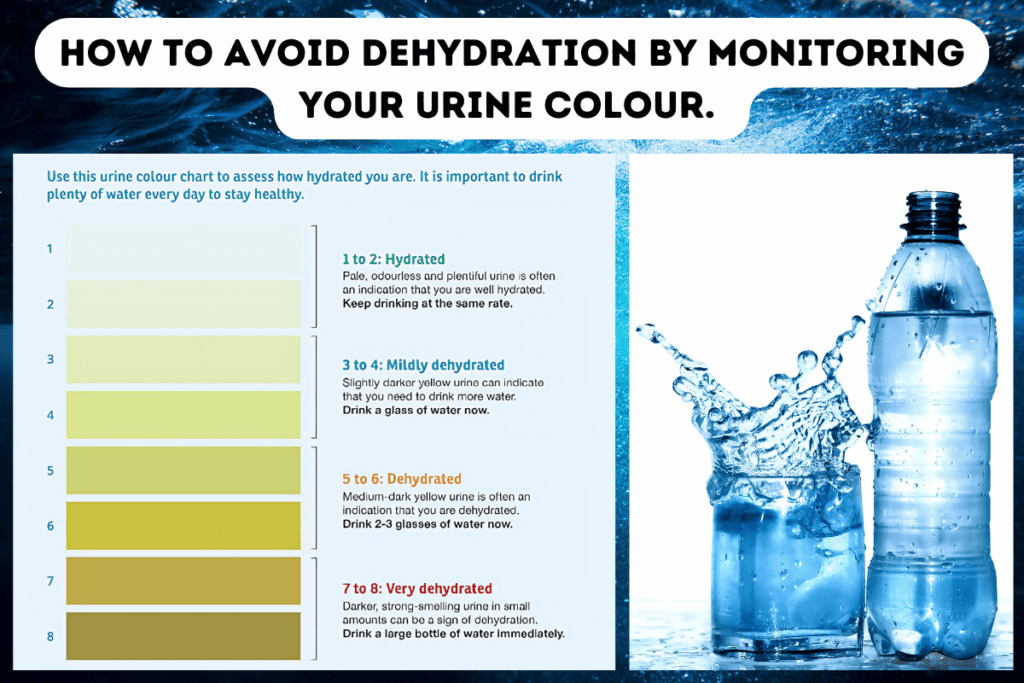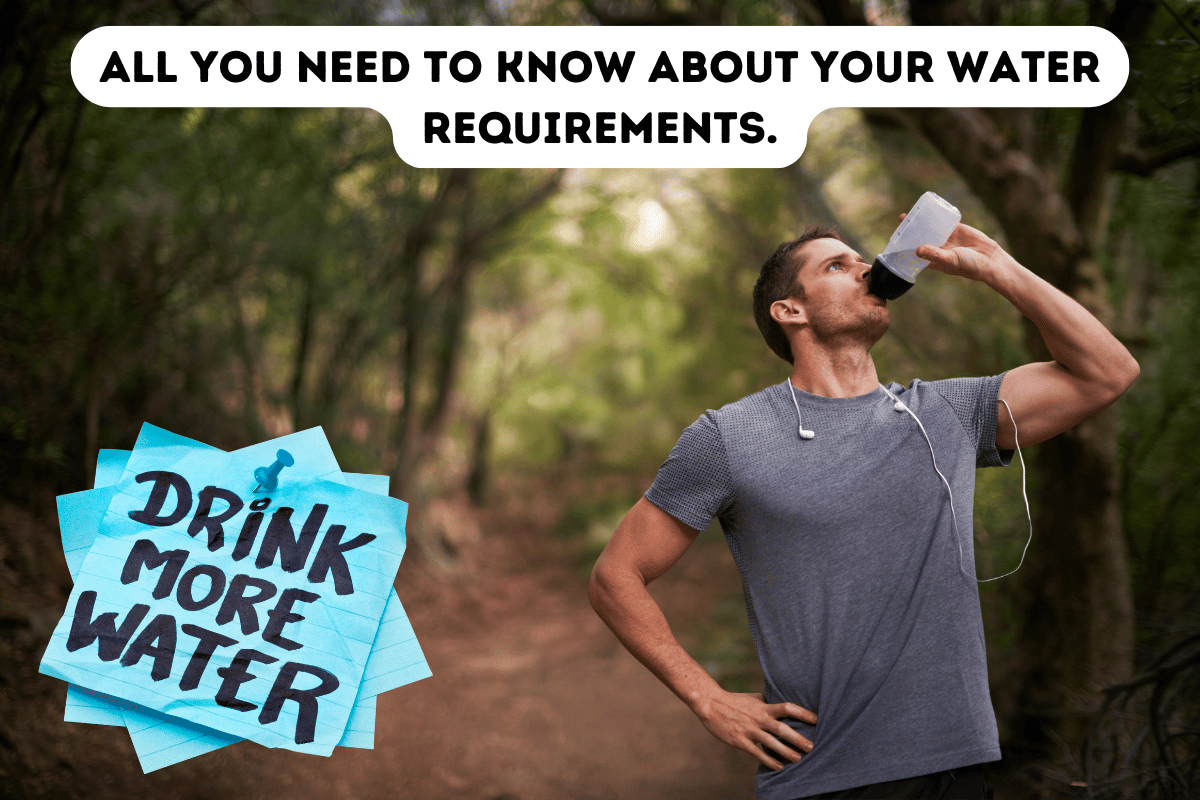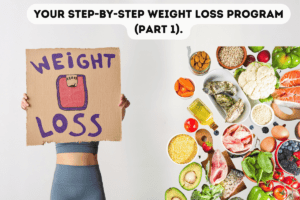Our body needs six essential nutrients: protein, fats, carbohydrates (including fibre), vitamins, minerals, and water. Water makes up between 50 and 75 per cent of our body weight. We can live for days or even weeks without food, but without water, we would not be able to last more than a day. Water in our bodies is like the oil for a car. Fuel, like food, provides energy, while water is like oil in the body, that helps everything to work correctly. Water in our bodies has such functions as temperature regulation, transportation of nutrients and compounds in blood, helping the kidneys function normally, removing waste products passed in the urine, and acting as a lubricant and shock absorber in joints. We can get Some of this water from the food we eat (the water content can be anything from 10 to 98%), but it’s not enough. To be healthy, it’s essential to get enough water during the day in addition to the water we are getting from food. In this article, we will look in detail at the way water functions in our bodies to keep us alive.
How much water do we need?
Every person’s fluid requirements are based on their energy requirements, which are determined by age, weight, and activity level. Environmental conditions, including temperature and humidity, also influence our fluid requirements. We generally need 1 ml of water for every kcal we burn. A typical sedentary or inactive person requires around 2 litres of water daily or 6-8 glasses daily. It is important to understand that alcoholic drinks don’t count toward your fluid intake (more about alcohol consumption, you can read in my article: “All you need to know about alcohol“.
A more active person’s requirement can increase by up to 10 litres per day, depending on their energy requirements and the environmental conditions. For example, an active person who burns 2,500 kcal daily would require around 2.5 litres of water per day. A very active athlete with energy needs of around 7,000 kcal would require approximately 7 litres of water daily. You can read more about hydration for athletes in my article: “Hydration strategies for athletes: how to keep your performance at its peak”.
Dehydration
We should drink water regularly to make sure that we meet our body’s needs. It’s important to know that our bodies store water like a sink without a plug. If we don’t top up our water levels, all the water we consume will be used or drained away. There are some situations when water can be stored in the body (in our feet, ankles, and legs), which is not a good sign. When water is stored in the body, it can also indicate something more dangerous, such as liver, kidney, or heart disease. In healthy people’s bodies, water is not stored.
If we do not drink enough water, we will get dehydration. Dehydration is an excessive body water loss, and it occurs when people lose more water than they are taking in. We lose water from our bodies through urination, defecation (diarrhoea can cause excessive water loss), breathing out (water is expired in the breath), sweating, and vomiting. Symptoms of dehydration include the feeling of thirst, our urine becoming dark and the volume being less than usual, we have a headache, our energy level being reduced, and we feel light-headed.
How to avoid dehydration?
So, dehydration is not a good thing. Here are some tips on how to avoid it:
- Drink a little and often throughout the day.
- Be sure to drink water before you are thirsty.
- Limit caffeinated drinks or at least change some of them with non-caffeinated drinks. Caffeine makes you dehydrated, so remember to drink more water after you drink coffee.
- Monitor your urine colour. Urine should be pale or slightly darker. Dark-coloured urine indicates dehydration.
- Try to drink water during bouts of vomiting and diarrhoea.

It can look challenging to start drinking 2L of water daily, so you can start doing this gradually. Start by drinking 500 ml daily and gradually increase this amount over several weeks. Just carry a 500 ml water bottle and try to drink it all by the end of the day. Slightly increase to 1L a day, after till 2L a day. If you are a busy person, you can use reminders. Just set the alarm on your mobile phone to remind you to drink water every 1–2 hours or use sticky notes instead, putting them all around your office and home. Also, it is essential to say that when you start drinking more water, you can notice that you need to urinate more often. It’s pretty normal. Your body was used to a certain level of hydration, and it would take a while for your bladder and fluid balance systems to get used to your new water-drinking regime.
How to avoid dehydration during exercise
An excellent way to find out how much water you lose during an exercise session is to weigh yourself before and afterwards. The drop in your weight at the end of the session doesn’t indicate how much weight or fat you have lost; it shows you the weight of fluid (or water) you’ve used. From the amount of your weight loss, you can easily calculate how much water you have used, as one litre weighs one kilogram. And the same amount of fluid that you lost you must replenish with water. Also, here are some additional tips on how to avoid dehydration during exercise:
- Do not start your exercise program if you are dehydrated, as it will make you more dehydrated.
- Don’t wear too much clothing during exercise as this will cause excessive sweating.
- Drink water throughout an exercise session (sipping is recommended).
- Replace any lost fluids immediately after an exercise session.
Over-hydration
Maybe you have heard or not, but from overhydration (drinking too much water), you can die. It is very rare in sedentary or mildly active people. Hyper-hydration mostly happens to distance or endurance athletes who drink too much water during exercise. This dilutes their electrolytes, which is worsened by the fact that they are already losing electrolytes in their sweat. As electrolytes are vital in many bodily functions, this can lead to collapse or coma. Just wanted to highlight this as an interesting fact. Now let’s discuss what type of fluids we should drink.
What to drink?
Although almost any type of non-alcoholic drink is suitable for keeping us hydrated, they all have advantages and drawbacks. In general, you should avoid drinks high in sugar and additives. Here, we look at each type of drink.
- Water. Good, clean water is best, whether tap or bottled, and nothing is better when you are thirsty than a refreshing glass of water. To make it more interesting, try adding a slice of lemon or lime and some ice.
- Tea and coffee. Tea is a refreshing drink, but you should know that it contains caffeine and could give you the jitters. The tannins in tea can also reduce your body’s ability to absorb iron from food. This is why you should avoid drinking tea at mealtimes. Pregnant women should limit their tea intake, and children should avoid drinking it. Finally, it would help if you remembered that tea and coffee are diuretics, which means they increase body water loss.
- Fizzy drinks. You should avoid soft drinks such as squashes and fizzy drinks. They usually contain large amounts of sugar that raise blood sugar. If drunk too often, they can contribute to obesity and tooth decay. It’s better to choose sugary-free drinks (they don’t contain essential nutrients but at least don’t give you unnecessary calories from free sugars).
- Milk. You can drink milk as it is a good source of calcium and excellent for building bones and teeth. However, you should limit your intake of milkshakes and smoothies as these contain sugar. Soya and almond milk are suitable substitutes for those who avoid dairy products.
- Fruit juices and smoothies. Fruit juices are a reasonably healthy option as they contain vitamins. However, they are usually low in fibre and high in sugar (from the fruit). You can have them once a day in about one small glass (150ml) because they contain sugars. Diluting fruit juice with water will help limit its effect on blood sugar levels. Also, it’s best to drink them with a meal.
- Sports drinks and energy drinks. Energy drinks usually contain a lot of caffeine and a lot of sugar. Sports drinks may have their uses for people performing high-energy training for over an hour. Still, for other sedentary people they are like any other fizzy or soft drink with plenty of sugar and calories. You should limit your intake of both these drinks if you are not a high-performance athlete.
- Alcoholic drinks. Alcoholic drinks don’t count toward your fluid intake. They have a diuretic effect (they make you lose more water in urine), so drinking alcohol may lead to dehydration. It is important to keep alcohol consumption within the recommended limits (no more than 14 units per week for both men and women). Also, alcoholic drinks contain calories and will contribute to your calorie intake; for example, a standard (175ml) glass of 12% wine contains about 126kcal, and a pint of 5% lager contains about 215kcal. More about alcohol read here.
Conclusion
So, let’s recap the main points of the lesson. As I wrote above, water is between 50 and 75 per cent of your body weight. We can live for days or even weeks without food, but without water, we would not be able to last more than a day. Water in our body has many functions that keep us alive and well. We generally need 1 ml of water for every kcal we burn. A typical sedentary or inactive person requires around 2 litres of water daily or 6-8 glasses of fluid daily. Dehydration is an excessive body water loss, and it occurs when people lose more water than they are taking in. One good suggestion to avoid dehydration is to carry a one-litre bottle of water with you and try to drink it all by the end of the day. To prevent dehydration during exercise, weigh yourself before and after an exercise session to find out how much fluid you have lost during the session. Any decrease in weight after the exercise session is just water loss, and you need to drink enough water to replace it. All in all, any type of non-alcoholic drink is suitable for keeping us hydrated, but some drinks are better than others. In general, though, you should avoid drinks that are high in sugar and additives. More information about hydration strategies for an athlete can be found here.




